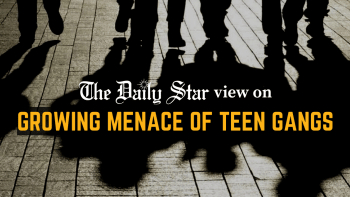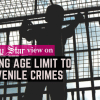Teen gang culture: Another way we are failing our youth

In the last one year, the Rapid Action Battalion (RAB) claimed to have arrested 349 teenage gang members. This alarming rise in teen gang culture shows the deterioration of our societal structure and how violence and lawlessness are increasingly consuming the lives of our young people. In Dhaka alone, around 50 teen gangs are said to be active, with members typically aged between 14 and 19 years. According to media reports, these gangs are often backed by a section of ruling party leaders, who act as influential "elder brothers."
Most of these young gang members are selling and abusing drugs, making the prospect of them having a peaceful, prosperous and fulfilling adult life extremely bleak. It is difficult to imagine how these young individuals, once they become so involved in violent and criminal behaviour, can be turned away from such anti-social activities as adults. This means we are creating more (possibly hardened) criminals, whose lives are being tragically destroyed—and who are being used to destroy the lives of others—even before they truly begin.
Experts noted that poverty, lack of education, unemployment, family dysfunction and exposure to violence have contributed to this subculture among the youth. These circumstances are driving some teenagers to seek a sense of identity, belonging and power with the structure of gangs. The fact that we are failing, as a nation, to provide our young people a better alternative points to a massive societal failure. And that young people are being frequently exposed to violence—and that it has become normalised—should concern us even more.
Research suggests that teenage gang culture has significant social, economic, and psychological impacts on society. The presence of such gangs creates an atmosphere of fear and insecurity, obstructing the development and well-being of affected communities. In Bangladesh, the proliferation of these gangs has led to increased crime rates, particularly in urban areas.
Under the circumstances, we, as a nation, must become much more conscientious about what we are exposing our youth to on a daily basis. The political violence that has become part and parcel of our society and politics must be questioned and changed. The political patronage being provided to these gangs has to be addressed from the very top. And our young people must be provided with better prospects and the promise of fulfilling lives.
Follow The Daily Star Opinion on Facebook for the latest opinions, commentaries and analyses by experts and professionals. To contribute your article or letter to The Daily Star Opinion, see our guidelines for submission.

 For all latest news, follow The Daily Star's Google News channel.
For all latest news, follow The Daily Star's Google News channel. 








Comments